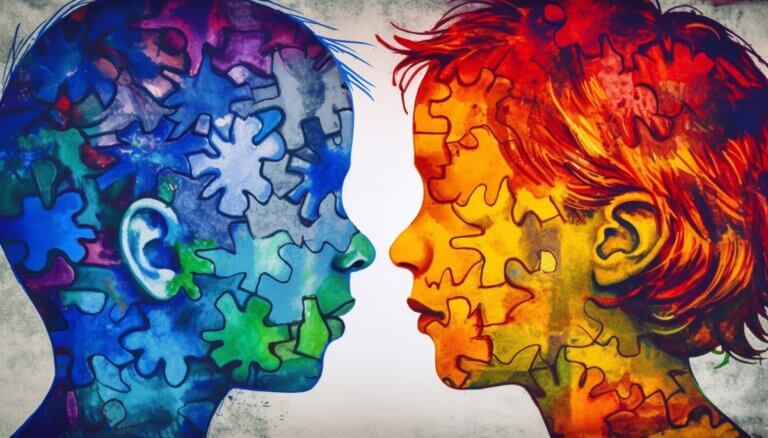Table of Contents
Self-awareness and Self-management

Recognizing and Understanding One’s Own Emotions
Emotional intelligence, once dismissed as a soft topic, has proven to be a crucial factor for personal and professional success. Emotional intelligence includes the ability to recognize and understand one’s own feelings. Improved emotional self-awareness boosts confidence and promotes empathetic interactions with others. By applying methods to enhance emotional intelligence, we can better control our responses to life’s challenges.
The Emotion Journal: A Mirror of the Soul
One of the most effective practical methods of emotional intelligence is keeping an emotion journal. This can significantly increase awareness of one’s own emotional patterns. Imagine you had a tough day at work and feel exhausted. By writing down these sensations, you might discover that certain events or interactions regularly lead to stress. Thus, vague feelings become clear triggers that you can then actively address.
- Initially, note when exactly you experience strong emotions.
- Analyze in a second step which events preceded these feelings.
- Thirdly, describe how you reacted to these feelings and what consequences ensued.
Harvard studies confirm that writing down emotions can indeed help reduce stress-related health issues. It serves not only as self-reflection but also functions as a therapeutic tool.
Mindfulness Meditation: The Path to Inner Clarity
Mindfulness meditation is an indispensable part of emotional intelligence development techniques. It trains awareness of the present moment and thus of one’s own emotions. The goal is not to evaluate or change the emotions, but simply to notice and acknowledge them.
- Begin your meditation with a few deep breaths to focus on the here and now.
- Now observe your own thoughts and feelings without getting carried away by them.
- End the meditation with the intention to give space to this new self-awareness in your daily life.
The effect of such meditations has been extensively studied and confirmed. For example, a study from the University of California shows that regular meditation can enhance the ability to self-regulate and contribute to emotional stability.
Integrating techniques for improving emotional intelligence and emotional intelligence exercises in daily life can be a real turning point. It enables us to consciously control our inner experiences and significantly improves the quality of our relationships. Through daily practice and continuous self-reflection, we shape the path to a more emotionally intelligent self.
Strategies for Regulating One’s Emotional World
Emotional Intelligence (EI) is a skill that enables us to understand, control, and express our own feelings, as well as recognize and appropriately respond to the emotions of others. In today’s fast-paced world, methods to enhance Emotional Intelligence are of increasing importance for personal and professional development.
The Power of Self-Reflection
A key to regulating one’s own emotional world is to develop an understanding of one’s own emotions. By adopting an attitude of self-reflection, you can gain deeper insight into your emotional states. This can be achieved, for example, through techniques such as keeping an emotion diary. Here, you regularly record how you feel in different situations and identify patterns and triggering factors of your emotional responses.
- If you notice that certain events regularly trigger stress, explicit Emotional Intelligence Improvement Techniques can be applied to proactively deal with these situations.
- Conscious breathing is a simple method to reduce acute emotional stress. Slow, controlled breaths can help calm the nervous system and clear the mind.
- Another technique is cognitive restructuring, where negative beliefs and thought patterns are identified and replaced with more positive ones. This changes the emotional response over the long term and is a core component of Practical Emotional Intelligence Methods.
The Role of Mindfulness
Mindfulness is another effective strategy in the toolbox for enhancing Emotional Intelligence. Through mindfulness exercises, you learn to be present in the current moment and to perceive thoughts and feelings without judgment. Studies show that this can lead to better emotional balance. Simple practices, such as conscious breathing or focusing on physical sensory perceptions, enhance this ability.
- One technique is the body scan meditation, which helps reduce stress and become more aware of one’s emotional state.
- Moreover, everyday activities such as walking or eating can be used as opportunities to practice mindfulness and hone one’s Emotional Intelligence Development Techniques.
Many people report positive experiences with these techniques and how they help them manage their emotions more effectively and lead a more fulfilling life. By integrating these Emotional Intelligence Exercises into daily life, you too can learn to better understand and regulate your emotions. Ultimately, it’s about having the tools to confidently handle emotional challenges and enhance the quality of your life and your interpersonal relationships. Emotional Intelligence is thus not just a concept from psychological studies – it is a practical skill whose development brings measurable benefits for everyone.
Social Awareness and Relationship Skills

Social Awareness and Relationship Skills
Empathy is a fundamental building block of Emotional Intelligence (EQ), the ability to recognize, understand, and appropriately respond to one’s own emotions and those of others. It enables not only sensing the feelings of others but also acting compassionately. In this article, we focus on methods for enhancing Emotional Intelligence, with a particular emphasis on empathy development and social perspective-taking.
Practical Emotional Intelligence Methods: Active Listening
An effective method to foster empathic abilities is active listening. Active listening involves not just ‘hearing’ but truly ‘listening’ to the other person. This creates a deeper connection and allows for a better understanding of the emotions and motives of others. A technique of active listening is paraphrasing, where you repeat what was said in your own words to ensure you have understood the other person’s viewpoint correctly.
- Talk less and let the other person finish their thoughts.
- Avoid making quick judgments or offering advice prematurely.
- Ask open-ended questions to further explore the thoughts and feelings of your conversational partner.
Emotional Intelligence Development Techniques: Role-Playing
Role-playing offers a dynamic way to enhance empathy skills. By putting yourself in someone else’s shoes and experiencing a situation from their perspective, you develop a deeper emotional understanding.
- In role-playing, you actively assume the role of the other person.
- Confront yourself with different viewpoints and emotional reactions.
- Use feedback from observers to reflect on and improve your perception and empathetic behavior.
The use of these Emotional Intelligence exercises can improve not only your social skills but also lead to better self-understanding and more successful interpersonal relationships. Scientific studies show that training in empathy and social skills leads to a measurable increase in emotional intelligence and contributes to a more harmonious interaction in all areas of life. By regularly practicing such Emotional Intelligence improvement techniques, you can significantly enhance your ability to adopt the perspective of others, becoming a more empathetic and emotionally intelligent person.
Building and Maintaining Interpersonal Relationships
Emotional Intelligence (EI) is the ability to understand, utilize, and appropriately respond to one’s own emotions and the emotions of others. A central aspect of EI is the development and maintenance of interpersonal relationships. This includes developing skills to improve communication and resolve conflicts more effectively.
Decoding I-Messages
One of the Emotional Intelligence development techniques for improving communication is the use of I-messages. This approach offers practical Emotional Intelligence methods to express openly and honestly what we feel and need without attacking or blaming others.
- An I-message typically starts with “I feel…”, followed by a description of one’s own emotions.
- Instead of saying “You always…”, the focus is directed to one’s own feelings, which elicits less defensive behavior from the conversational partner.
- This promotes mutual understanding and respect, key components of a successful Emotional Intelligence enhancement technique.
Connecting Communication for Conflict Resolution
Another important approach within the methods to boost Emotional Intelligence is the technique of “Connecting Communication”. Inspired by the principles of Nonviolent Communication, this method fosters a deep understanding of the needs behind someone’s actions and words.
- It involves actively listening and recognizing the needs behind accusations and criticism.
- The goal is to communicate without judgments or attributions, thus setting the stage for a positive conflict resolution.
- Through this empathetic exchange, bonds are strengthened and Emotional Intelligence exercises are put into practice.
Improving emotional intelligence through such techniques is no simple task. It requires self-reflection, the willingness to break old patterns, and consistent practice. However, the results – improved relationships and less stress in conflicts – speak for themselves.
Consider a couple suffering from recurring disputes. By both partners using I-messages, they can communicate their true feelings without blaming the other. With the method of Connecting Communication, they can then discover the underlying needs of the other and find solutions that satisfy both. This not only demonstrates the power of emotional intelligence but also how it can concretely improve cohabitation.
By daily practicing these Emotional Intelligence exercises and continuous self-reflection, emotional intelligence is not only developed but also becomes part of our being. It is an essential factor for personal and professional success and should therefore have a permanent place in everyone’s personal development.
Summary
Emotional intelligence, once considered a marginal topic, has proven to be a critical building block for success in both personal and professional life. Techniques for Improving Emotional Intelligence provide us with tools to better respond to life’s challenges and strengthen our relationships. A key approach is keeping an emotion journal to enhance emotional self-awareness.
- The first practical step is to note the moments when strong emotions occur.
- Next, we analyze the events that preceded these feelings.
- Finally, we reflect on how our behavior was influenced by these feelings and what consequences this entailed.
Harvard studies confirm the benefits of such self-reflection. They show how Emotional Intelligence exercises can contribute to stress reduction.
Mindfulness as the Key
Mindfulness meditation is another method to strengthen our emotional intelligence. It creates space for our feelings in the present moment, without judging them.
- We begin the meditation with deep breaths and focus on the now.
- By observing our own thoughts and feelings without judgment, we can integrate a new self-awareness into everyday life.
A University of California study illustrates how regular meditation aids in self-regulation and contributes to emotional stability. These exercises are part of the Methods for Enhancing Emotional Intelligence, which can lead to improved quality of life.
Additionally, self-reflection plays a vital role in regulating emotions. Conscious breathing and cognitive restructuring are further Practical Emotional Intelligence Methods that help us live in harmony with our emotions.
Empathy and social perspective-taking are additional pillars of Emotional Intelligence. With active listening and role-playing as Emotional Intelligence Development Techniques, we can enhance our capacity for empathy and forge deeper connections with others.
Communication techniques such as I-messages and ‘Connecting Communication’ also contribute to improving our Emotional Intelligence. They allow us to express our needs and respond to those of others, which is crucial for conflict resolution.
These strategies, coupled with continuous practice and self-reflection, can substantially increase Emotional Intelligence and are crucial for a fulfilled life and successful relationships.
FAQ – Techniques for Improving Emotional Intelligence
What daily practice can I engage in to improve my emotional awareness and ability to empathically listen?
To sharpen your emotional awareness, practice daily self-reflection by documenting your feelings in a journal and attempting to identify the causes and influences of these emotions. To improve empathic listening, set a goal to be fully present in conversations, consciously pay attention to non-verbal signals of conversation partners, and verbally mirror their emotions to deepen understanding and connection.
What practical exercise can I perform daily to improve my emotional intelligence?
To enhance your emotional intelligence daily, start with the practice of self-reflection by spending a few minutes each evening reviewing the emotional highs and lows of the day, understanding how your feelings have influenced your reactions, and considering how you might respond more constructively in similar future situations. Additionally, active listening in conversations can help develop empathy and understanding of others’ feelings, make sure to really hear what is being said, and acknowledge the emotions of your counterpart without immediately responding with your own experiences or solutions.
What daily practice can I engage in to specifically improve my emotional intelligence?
To improve your emotional intelligence daily, start by regularly reflecting on your own emotions and analyzing their triggers as well as your responses. Furthermore, enhance your empathy by consciously paying attention to other people’s body language, tone of voice, and perspectives, and attempting to understand their feelings. This creates a foundation for deep understanding and effective communication.




